 Petzlover
Petzlover Drentse Patrijshond is originated from Netherlands but Parson Russell Terrier is originated from United Kingdom. Drentse Patrijshond may grow 27 cm / 11 inches higher than Parson Russell Terrier. Drentse Patrijshond may weigh 22 kg / 49 pounds more than Parson Russell Terrier. Both Drentse Patrijshond and Parson Russell Terrier has same life span. Both Drentse Patrijshond and Parson Russell Terrier has almost same litter size. Both Drentse Patrijshond and Parson Russell Terrier requires Moderate Maintenance.
Drentse Patrijshond is originated from Netherlands but Parson Russell Terrier is originated from United Kingdom. Drentse Patrijshond may grow 27 cm / 11 inches higher than Parson Russell Terrier. Drentse Patrijshond may weigh 22 kg / 49 pounds more than Parson Russell Terrier. Both Drentse Patrijshond and Parson Russell Terrier has same life span. Both Drentse Patrijshond and Parson Russell Terrier has almost same litter size. Both Drentse Patrijshond and Parson Russell Terrier requires Moderate Maintenance.
 The Drentse Patrijshond came about in the 1930-1950s. The breed developed from pointing dogs which originated in Spain, arriving in the Netherlands in the 16th century and being known as Partridge dogs.
The Drentse Patrijshond came about in the 1930-1950s. The breed developed from pointing dogs which originated in Spain, arriving in the Netherlands in the 16th century and being known as Partridge dogs.
The eastern part was known as the Province of Drenthe, and it is this area where these Partridge dogs were bred exclusively, not being mixed with other unknown breeds.
After World War II the Drentse Patrijshond was also recognized by the FCI. It was a popular dog in the Netherlands and the breed was also recognized by the Dutch Kennel Club in 1943. The Dretse’s popularity grew in other European countries too. In the 1960s some of the dogs entered the United States and in 2008 the Drentse Patrijshond Club of North America was established.
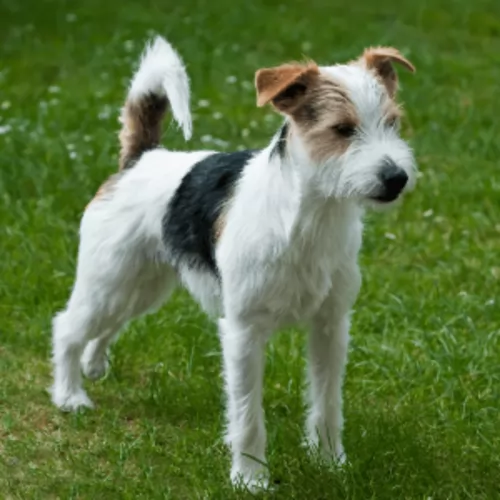 The Parson Russell Terrier hails from England and is a small to medium sized dog dating back to the 18th century. It is believed that Reverend John ‘Jack’ Russell was the developer of this dog. The Parson has always been involved with England’s sport of foxhunting.
The Parson Russell Terrier hails from England and is a small to medium sized dog dating back to the 18th century. It is believed that Reverend John ‘Jack’ Russell was the developer of this dog. The Parson has always been involved with England’s sport of foxhunting.
They’re spritely and quick and have been able to keep up on a hunt and take on a fox in its lair. The dog was first recognized in 1990 in the United Kingdom as the Parson Jack Russell Terrier and in America in 1997.
All the top kennel clubs recognize this dog as the Parson Jack Russell Terrier.
 The Drentse Patrijshond is a medium to large sized dog standing between 55 and 63cm in height and weighing anything between 18 and 30kg. He is a working dog and known by other names such as Dutch Partridge Dog and Dutch Gundog among others.
The Drentse Patrijshond is a medium to large sized dog standing between 55 and 63cm in height and weighing anything between 18 and 30kg. He is a working dog and known by other names such as Dutch Partridge Dog and Dutch Gundog among others.
The coat of the dog is medium length and dense and is mostly white with reddish brown markings. People looking at him liken him to a spaniel, pointer or setter kind of dog. He is athletic and muscular with a long feathery tail, floppy ears and a brown nose with amber colored eyes.
The Drentsche Patrijshond is an amicable family dog who is relaxed and calm around other pets in the home as well as children. In fact it is the kind of dog that forms a strong bond with his human family, not liking to be left alone.
He is a lively, alert and playful dog with a tendency to be a bit stubborn but this is easily dealt with when he undergoes training and socialization. He is an adaptable dog, being able to fit into life in the city or the countryside, just so long as his beloved owners are close by. However, he is very active and will require an owner who will take time out to take him on walks or involve him in lots of outdoor activities.
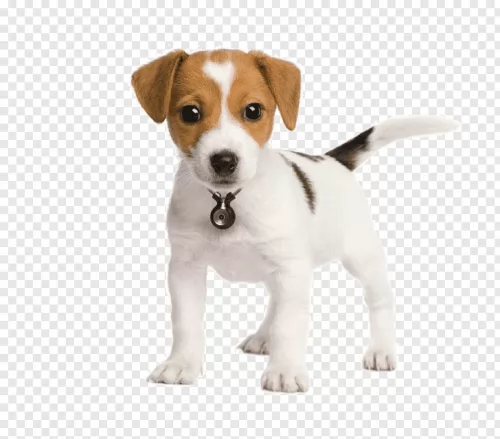 The Parson Jack Russell is essentially a white dog with black and tan or orange-fawn patches. He can be tri-colored too. The coat is either smooth, rough or broken.
The Parson Jack Russell is essentially a white dog with black and tan or orange-fawn patches. He can be tri-colored too. The coat is either smooth, rough or broken.
He stands at between 33–36cm tall at the withers and weighs between 5 and 8kg. Unlike the Jack Russell, the Parson Russell Terrier has longer legs. He has some longer hair on the head, legs and body. The ears are floppy wit the tip pointed forward. The tail has always been docked but when left long it it held high, slightly curving over the back.
Feisty, brave, cheeky and alert, the Parson Russell Terrier is an energetic dog who gets on well with children as he knows that this is essentially where his games come from.
He is bold and clever and you’ll be able to have him trained and socialized without any trouble. These little dogs are full of life and they are protective of their humans and their property, making excellent watchdogs.
 The Drentse Patrijshond is a breed of dog that is particularly human orientated – just loving being around his human family.
The Drentse Patrijshond is a breed of dog that is particularly human orientated – just loving being around his human family.
He forms a deep bond with those that care for him and he can’t bear to be separated from his human family. The dog has always had a strong hunting instinct but these days this sweet, loyal dog is much more a devoted family pet who is more than happy to come indoors and make himself at home among his family members.
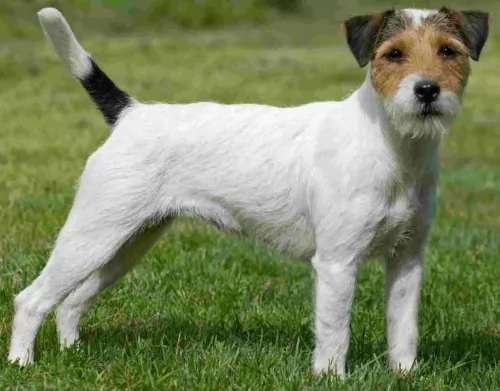 In general the Parson is a friendly,loving dog, fairly small but packed full of feisty personality.
In general the Parson is a friendly,loving dog, fairly small but packed full of feisty personality.
They make excellent pets for the entire family. He is an intelligent dog, but typical of most terriers he can be stubborn, but this can easily be fixed with training and socialization. With good care, he’ll make you a wonderful little pet and companion.
 The Drentse is a fairly healthy dog breed, with a life span of 12 to 15 years. No matter how healthy your dog, there will always be some health issues it may face. Environmental factors and diet can play an important part in his wellbeing.
The Drentse is a fairly healthy dog breed, with a life span of 12 to 15 years. No matter how healthy your dog, there will always be some health issues it may face. Environmental factors and diet can play an important part in his wellbeing.
Health concerns with this breed can include progressive retinal atrophy, hip dysplasia as well as hereditary stomatocytosis. This is a disorder that affects the dog’s cells walls.
Too much fluid gets into the cells and this damages red blood cells. Some breeds are more prone to this disorder, and the Drentse Patrijshond is one. It is an hereditary disorder that results in chronic anemia and liver disease.
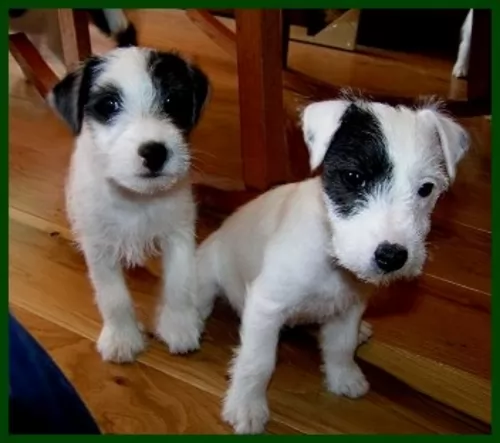 Your Parson Jack Russell can live to be between 12 and 15 years but nonetheless he does have some breed-related health issues to watch for.
Your Parson Jack Russell can live to be between 12 and 15 years but nonetheless he does have some breed-related health issues to watch for.
Eye conditions which can affect this dog include primary lens luxation,cataracts, corneal dystrophy and progressive retinal atrophy. With cataracts the lens of the eye develops a cloudy look resulting in poorer vision and sometimes blindness. Cataract surgery is available for dogs.
Your Parson Jack Russel should be lean and muscular and always full of energy. Avoid feeding him unhealthy treats which can lead to obesity and other health problems.
All kinds of parasites such as ticks, fleas and worms can invade your dog’s body. Roundworms, hookworms and tapeworms can cause havoc with their health and some of these parasites can even be transmitted to humans. It’s why it is important to get your puppy to the vet to be de-wormed and to get his first injections.
A liver disorder known as portosystemic shunt can mean that some of the blood supply doesn’t get to the liver and it doesn’t function properly. This will mean the liver can’t remove toxins from the bloodstream effectively.
 This dog is quite a heavy shedder, but even so, he won’t need professional grooming – just a good brushing twice a week.
This dog is quite a heavy shedder, but even so, he won’t need professional grooming – just a good brushing twice a week.
The teeth will need to be brushed 2 or 3x a week and because he has floppy ears, these will need to be checked for infection. It’s a good idea to clean them with some special dog ear cleanser, but if you’re not sure how, your vet or a professional groomer can do it for you.
Cut your dog’ nails, but once again if you think you might cut into the quick of the nail, causing bleeding and pain, a professional groomer can do it for you.
The Drentsche Patrijshond will require quality dry dog food. Speak to your vet about the best kibble that ensures your pet gets his full quota of vitamins and minerals. Add in cooked brown rice, vegetables and chicken from time to time and include some raw meat wherever possible. Adding in some raw meat helps to stave off dry, red, irritated skin. Your pet will also need access to fresh, cool water day and night.
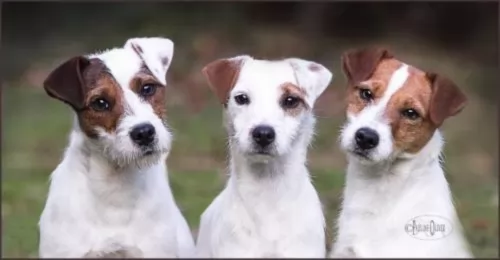 The Parson Russell Terrier has different coat types – the smooth and rough and both will require regular brushing. Rough coats will require plucking or clipping to avoid matting.
The Parson Russell Terrier has different coat types – the smooth and rough and both will require regular brushing. Rough coats will require plucking or clipping to avoid matting.
Check his eyes and ears regularly. Look inside his ears for excess wax and dirt which could lead to an ear infection. His nails should also be trimmed.
The best thing you can do for your Parson Russell Terrier if you don’t want your pet producing puppies is to have it spayed or neutered. Spaying for females or neutering for males decreases the likelihood of certain types of cancers too so it can be beneficial.
Diet is hugely important for a Parson Russell Terrier and the food you decide for him can impact his health. Many time those ‘treats’ you feed your pet do nothing more but give him a stomach ache.
It's tempting to pop chocolates, popcorn, nuts and ice cream into your pets mouth when he is so adorable but in the long run it is shortening his life. All he basically requires and needs is a simple, consistent diet of the top commercially manufactured foods mixed with some tasty home made food from time to time.
Boiled chicken, brown rice and vegetables such as sweet potatoes, carrots and spinach will do your pet wonders. Ensure he always has fresh, cool water available to him.